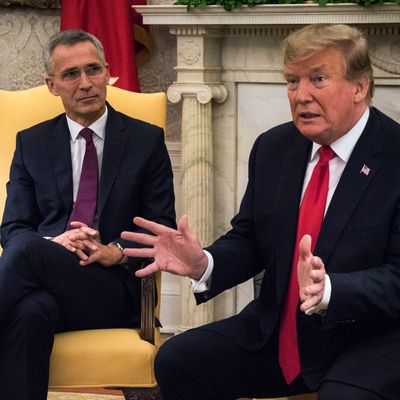
Seventy years is a long time for an alliance to survive. Most of history’s examples didn’t make it half that. So the planners at the North Atlantic Treaty Organization — which has bound Europe’s formerly fractious Western powers to each other, Washington, and their smaller neighbors since the aftermath of World War II — did their best to make sure this week’s anniversary celebration would survive President “Pay Me My Money” Trump.
Unlike its gaudy celebrations on anniversaries past, the meeting on April 3 and 4 in Washington was downgraded to only involve foreign ministers from NATO’s 29 member countries. NATO Secretary General Jens Stoltenberg arrived in Washington knowing, as former State Department official Jeremy Shapiro has noted, that “the secret to getting Trump to stop bothering you is not to beg or change your behavior. It is to give him credit for something he can claim as a win in U.S. domestic politics.”
Stoltenberg went to the White House on Tuesday with every intention of crediting Washington with the foresight to found, support, and sustain NATO, the most successful alliance in the history of the world. And it half-worked — the president did not repeat his arguments that NATO is obsolete, or embarrass Stoltenberg or other NATO leaders with personal feuds. However, Trump reverted quickly to complaining about Europeans needing to pay more for their defense, rather than promoting a story about America’s success, leadership, or commitment to peace.
And, as an odd bonus, Trump repeated his false claim that his father was born in Germany (Fred Trump was, in fact, born in the Bronx.) Does he do this because he thinks it elevates his father’s social status? Because he thinks it gives him credibility to berate Europeans? Or just to make European diplomats concentrate on keeping straight faces instead of responding effectively to what he’s saying?
So NATO’s party did not get off to the best possible start, though it could have been worse. NATO’s success probably won’t get much cable news coverage this week, but there won’t be stories about Trump renewing his attacks on the alliance either.
In fairness, though, Trump was neither the first nor only skunk at this party. The United Kingdom — Washington’s closest ally and one of only a handful of allies that do meet the 2 percent of GDP goal for defense spending adopted under President Obama — wasn’t able to send its foreign minister to D.C., as he had to stay in Parliament to participate in what appears to be the slow process of a great democracy disemboweling itself over Brexit.
The government of Turkey — the alliance’s second-largest military power and soon its second-most populous nation — embarrassed itself last week by trying and failing to manipulate elections. It is also moving ahead, despite NATO opposition, with plans to buy Russian anti-aircraft missiles. They’ll come with Russian technicians and technology that can pick up information on sensitive U.S. and NATO equipment Turkey has or might buy. Then there’s Hungary, whose governing party is so far right that its fellow conservatives in the European Union have suspended it. This is not the Europe whole and free that George H.W. Bush promised us with an expanded NATO at the end of the Cold War.
On the other hand, an alliance that can muster 50,000 service members for exercises and develop shared responses to challenges ranging from the Russian poisoning of a defector on British soil to drowning migrants in the Mediterranean to the 9/11 attacks is not ready for the ash heap of history just yet. Most important, neither Europe nor Washington has anything to replace the concept that democracies owe each other solidarity and benefit from working together. That’s an idea that everyone from Bernie Sanders to Lindsey Graham, not to mention an awful lot of smart people in between, agrees on.
The challenge for NATO leaders in Washington over the next two days — and even more for NATO supporters after the party is over — is to resist the temptation to look backward and focus on defending what NATO was five, ten, or 20 years ago. Instead, it’s time to start really challenging conversations about what we on both sides of the Atlantic need NATO to be going forward. Is it more important, for example, for NATO to defend democracy, even if that means sanctioning or suspending its own members, or more important to keep major security actors like Turkey inside the alliance? Is it in Washington’s interest that the alliance sustain active pressure on Russia, and what are realistic goals for that when governments like Italy (and, er, others) take pro-Putin stances? Much discussion focuses, rightly, on whether our allies still believe NATO’s core guarantee that an attack on one is an attack on all. Coming to a new understanding of what that means is going to be nerve-racking for governments who much preferred to cloak actual commitments in wreaths of World War II rhetoric. But if we want an alliance that is more likely to prevent than precipitate World War III, clarity on that count is going to be key.
So it’s a very good step that the secretary general added a Wednesday appearance before Congress to his itinerary, at Speaker Pelosi’s invitation. He and the new generation of House members, both Democrats and Republicans, should be sure to meet — because they are the ones who will need to shape a future that looks worth celebrating.





























